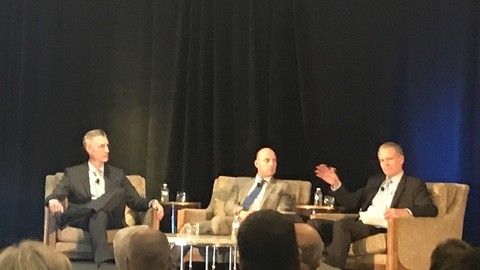WASHINGTON, D.C.—Under the Trump administration, the game has changed for the Medicaid managed care industry. Yet the way one CEO sees it, that isn’t necessarily bad.
“Everyone knows the Medicaid gold rush is over,” Cardinal Innovations Healthcare CEO Richard Topping said bluntly during the Medicaid Health Plans of America conference on Monday. The industry, he added, is basically in a recession.
But the good news, he said, is that health plans have an opportunity to consolidate the gains they made during the boom years of Medicaid expansion.
“Now is the time to do more with less,” he said.

One way managed care plans can do that is to prove that they are uniquely positioned to integrate care and address the social determinants of health, said Toby Douglas, senior vice president of Medicaid solutions for Centene.
“The issue of social determinants has become front and center within the Medicaid program,” he said, noting that insurers like Centene are taking a variety of approaches, from linking members to needed social services to pairing them with life coaches.
But in order to truly maximize health plans’ capabilities, state and federal regulators must develop reimbursement rates that are both actuarially sound and allow plans to tackle tricky issues, such as reducing emergency department utilization.
Centene is also focused on adapting to different regulatory parameters put in place by the states where it sells plans, Douglas noted. For instance, in Indiana—where the state established a conservative twist on Medicaid expansion—Centene developed a health savings account option for its Medicaid members and designed plans that reward members for healthy behaviors.
And as more states take advantage of section 1115 waivers to retool their Medicaid programs, private insurers must learn to make the most of this changing landscape.
“There needs to be a role for plans in this new member accountability framework,” Douglas said.
RELATED: What's next for Medicaid—Experts weigh in on waivers, expansion, work requirements
For CalOptima, one of the biggest issues in two cities where it sells plans—Santa Ana and Anaheim—was a growing homeless population, according to CEO Michael Schrader. So the insurer started a recuperative program that provided those discharged from the hospital or ED with a clean, safe place to live for 15 days.
Given that the program was “remarkably successful” with a relatively low cost, CalOptima and its partners applied for and were granted a five-year, $30 million grant via a section 1115 waiver to expand the program—including opening it up to individuals coming in from settings other than the hospital.
“The community, I think, is really pleased with the steps that we’re taking,” Schrader said.
Medicaid managed care plans must also rise to meet the steep challenges posed by the opioid epidemic, according to the executives.
“We are getting a chance to be front-page here,” Topping said, noting that plans must leverage their capabilities to address the ever-growing public health crisis.
One way Centene is doing that is by using data analytics to identify populations at risk for opioid abuse and misuse, Douglas said. It also found value in offering case management services to members in Ohio who are pregnant and struggling with addiction.
But while health plans must step up, it’s also worth noting that they can’t do it alone. Instead, it will take the efforts of the “whole delivery system,” he said.